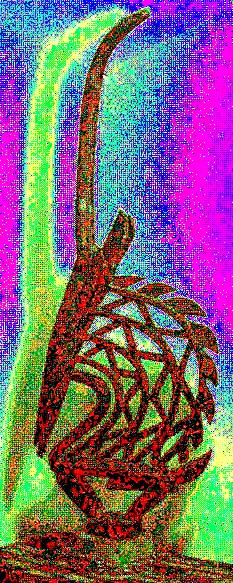 |
Feast of the Holy Family
Parenting.
You
can't do it by yourself.
|
This is just a little preliminary remark about this
passage from Luke. Luke is really
interesting among the four canonical gospels because every time he tells a
story about a man, he tells a story about a woman. Or vice versa. So we get the
annunciation of John the Baptist to Zechariah, the annunciation to Mary about
Jesus. He goes through the whole of the gospels and he pairs these things. He's
kind of an equal opportunity evangelist. That's nice to be aware of, I think.
The Feast of the Holy Family is late and it's really
very strange. As we have all these
fundamentalist Christian groups: Focus on the Family, Real Women...etc.
etc. Dan Quayle talking endlessly about
family values. Yet, I think, they
really overlook the central and startling fact about the family as we find it
in the New Testament. Every time Jesus
talks about the family, just like when he talks about authority, he warns about
it. Well, looking for your mother and brother, "Who is my mother and
brother?" "Whoever hears the word of God and lives out of it. Unless
you hate father and mother, sister and brother"....all this and more. It's
fascinating. In other words, we have another instance of the most fundamental
human reality, our relationship with our family, drastically relativized here
by Jesus.
As a parent, that is enormously intimidating because
raising kids is an exhausting job and you just pour yourself into it, day in
and day out, day in and day out. You
want some kind of payback from this.
You want some kind of reciprocation. By that I mean, we want gratitude,
a kind of sense of indebtedness (we want all kinds of other things too). But what Jesus is saying is that the whole
point of parenting is to prepare a kid to detach from those earliest and most
fundamental human bonds in order to be radically open to God.
Again, we have all been in a family, we are all part
of a family. It is interesting to have
this feast right after Christmas when the suicide rate is so high and people's
depression is so enormous. We have, somehow in the process of secularising
Christmas, mystified the family. I mean
it seems to me that we put a weight on the family that is just literally unbearable.
For the family, now, one day of the year is supposed to supply all kinds of
stuff that it never does for the other 364 days. Everyone is drained by the whole phenomenon. Now, if you withdraw
God then that kind of family connectedness makes all kinds of sense. But also,
it makes it intolerable. Literally,
intolerable.
So what can we take from the Feast of the Holy
Family? A number of things. I think one
of the first things that is said is to disabuse us, especially those of us who
are parents, of the kind of proprietary feeling that we have about our kids.
"This is my kid. My
kid." Again that's very hard
because you work so bloody hard, precisely, in keeping the little nipper from
killing himself or herself or somebody else in the process of growing up, to
say that this child is ultimately God's.
But there's this other wholly liberating aspect of
that, of course. We are relieved of a
highly overdrawn and impossible burden: that we are utterly and absolutely
responsible for our children. No. They
are still God's. By saying that, I don't
mean to say that we can have a kind of laissez-faire attitude toward them. But
it makes a great deal of difference, it seems to me, if I'm aware, even in the
most serious and earnest exertions on behalf of my kids, that they are still
God's before they're mine.
The other issue, which, I think, is really salient
here, is this matter of being able to hear the word of God and follow it. That matter of being part of God's
family. That raises all kinds of
questions. What do I do or what has
been done to me, so that God has become inaudible? Lots of stuff, I think. Deprivation, I think, is a major
instance. Freud, on a very superficial level was absolutely right when he said
that God was basically the father that none of us ever had. But it is also very
clear that that kind of religiosity is also very immature. The sense of
self-engrossment results from that sense of deprivation. Now deprivation takes
many, many other forms. It doesn't mean giving the kid too little, it also
means giving the kid too much. That,
too, is a form of deprivation, whereby a child grows incapable of seeing
himself or herself as connected to the rest of the world. I am fully aware in
saying this, how difficult this is to bring off. It is enormously difficult. It requires subtlety and prudence of
an incalculable degree.
But, what the Feast of the Holy Family does is to
always bring us to the same place. We are incapable of bringing off the most
central and important human activity.
Parenting. We can't do it by
ourselves. For all kinds of reasons, we literally cannot do it by ourselves. My
parents didn't do it for me and I'm not doing it for my kids and my kids are
not doing it for their kids. And that's all right. That's simply the truth.
It's not a horrific and terrifying truth. Well, it may be that, but it is also a liberating truth. It
liberates us in order to seek the God that does grace us with her presence, who
does nourish us, who does somehow free us from our own neuroses and dense-ness
that we can provide for kids a world in which they can rejoin us. But rejoin us
in God. Which means we rejoin everybody
else too.
